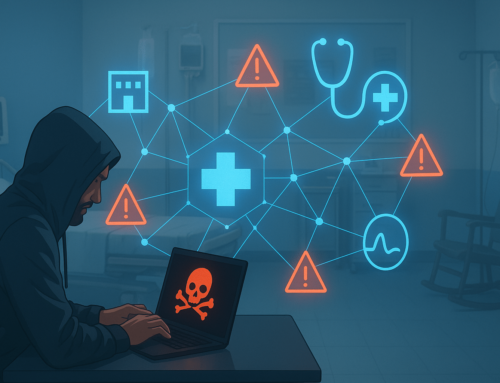Ransomware healthcare attacks should be a cause for concern for anyone working in healthcare. Ransomware attacks occur when an unauthorized party accesses an organization’s network, encrypting files until a sum of money is paid for their return. The healthcare industry has become the top target for hackers in part due to the sensitive information they handle and the lack of advanced cybersecurity practices.
400 Dental Practices Affected by Ransomware Healthcare Attack
Software company Digital Dental Record (DDS) experienced a ransomware healthcare attack that enabled hackers to access their system. DDS is a cloud-based management provider for 900 dental practices across the country. DDS Safe, their backup solution, is supposed to protect dental practices against ransomware attacks, however, this is the system hackers used to infiltrate DDS.
Although not all DDS clients were affected by the ransomware healthcare attack, it is estimated that 400 to 500 practices were breached. The attack encrypted patient files, making them unreadable. Hackers then demanded ransom to be paid for the files to be returned. DDS enlisted a third-party software company, PerCSoft, to decrypt affected files. To decrypt files, it is likely that PerCSoft paid the ransom, estimated to be $5,000 per client, a total of $2.5 million.
PerCSoft has already begun the process of decrypting files, however, several affected dental practices claim that their files were lost in the ransomware healthcare attack, or that decryption has not worked. The decryption process will take some time as it takes between 30 minutes to 4 hours per client. So far 100 DDS clients have had their files restored.
116,000 Patients’ PHI at Risk from Ransomware Healthcare Attack
Imperial Health, a physicians’ network based in Louisiana, experienced a ransomware healthcare attack that affected 116,262 patients. The affected individuals were patients of Imperial’s Center for Orthopedics. The files that were accessed and downloaded by an unauthorized party were encrypted, making it unclear whether or not files were viewed.
The copied files included the protected health information (PHI) of patients, although the type of information varied by individual. Information that may have been viewed included phone numbers, addresses, names, date of birth, treatment information, diagnosis, medications, medical record numbers, Social Security numbers, and other clinical information.
Although it is unclear if patient information was accessed, Imperial Health has taken the proper precautions by notifying affected individuals, and implementing new antivirus software. Ransomware has been removed for Imperial’s systems, however, files have not yet been restored.









